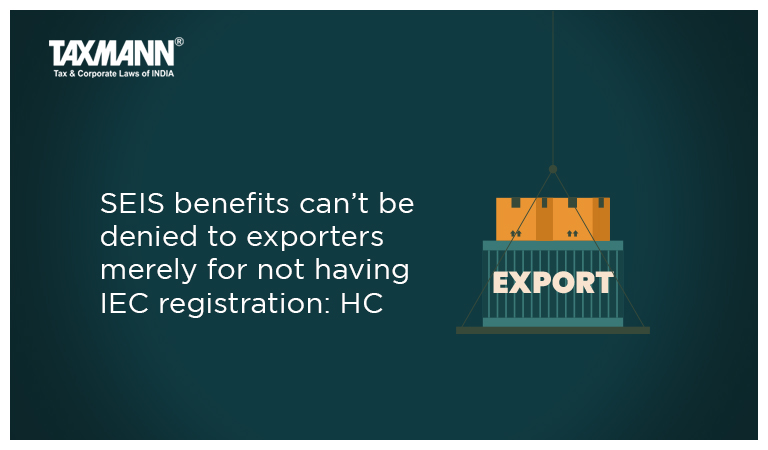SEIS benefits can’t be denied to exporters merely for not having IEC registration: HC
- News|Blog|GST & Customs|
- 2 Min Read
- By Taxmann
- |
- Last Updated on 4 August, 2022

Case Details: Smarte Solutions (P.) Ltd. v. Union of India - [2022] 141 taxmann.com 60 (Bombay)
Judiciary and Counsel Details
-
- S.V. Gangapurwala & Vinay Joshi, JJ.
- Ms Meetika Baghul, Ms Anveshika Singh & Ms Sharon Patole, Advs. for the Petitioner.
- Ms Shehnaz V. Bharucha, Ms Priyanka Chavan & A.A. Ansari, Advs. for the Respondent.
Facts of the Case
The petitioner exported the services but it did not have a valid IEC number. However while applying for the reward/benefit under the scheme, it had obtained an IEC number and applied accordingly. The benefit was denied to the petitioner on the ground that the eligibility criteria of Clause 3.08(f) of the FTP has imposed additional restriction of having IEC number at the time of rendering services. The petitioner filed writ petition against the same.
High Court Held
The Honorable High Court observed that the proviso to section 7 of the Foreign Trade (Development and Regulation) Act, 1992 does not lay down that the IEC number is essential at the time of rending services. The requirement of IEC number would be only for taking benefits under the scheme. Therefore, it would be abundant clear that the eligibility criteria of Clause 3.08(f) of the FTP has imposed additional restriction of having IEC number at the time of rendering services which was not intent or purport of the statute. Therefore, the said condition was against the principal legislation and therefore, it can’t be termed as of mandatory nature for availing benefits under the scheme. Thus, the petition was allowed and the Court directed to consider the petitioner’s application without insisting for an active IEC number at the time of rendering services.
Disclaimer: The content/information published on the website is only for general information of the user and shall not be construed as legal advice. While the Taxmann has exercised reasonable efforts to ensure the veracity of information/content published, Taxmann shall be under no liability in any manner whatsoever for incorrect information, if any.

Taxmann Publications has a dedicated in-house Research & Editorial Team. This team consists of a team of Chartered Accountants, Company Secretaries, and Lawyers. This team works under the guidance and supervision of editor-in-chief Mr Rakesh Bhargava.
The Research and Editorial Team is responsible for developing reliable and accurate content for the readers. The team follows the six-sigma approach to achieve the benchmark of zero error in its publications and research platforms. The team ensures that the following publication guidelines are thoroughly followed while developing the content:
- The statutory material is obtained only from the authorized and reliable sources
- All the latest developments in the judicial and legislative fields are covered
- Prepare the analytical write-ups on current, controversial, and important issues to help the readers to understand the concept and its implications
- Every content published by Taxmann is complete, accurate and lucid
- All evidence-based statements are supported with proper reference to Section, Circular No., Notification No. or citations
- The golden rules of grammar, style and consistency are thoroughly followed
- Font and size that’s easy to read and remain consistent across all imprint and digital publications are applied



 CA | CS | CMA
CA | CS | CMA
